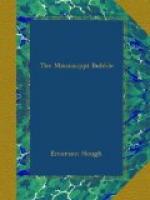Law smiled at the sturdy vehemence of the other’s speech, yet there was something of soberness in his own reply.
“Sir,” said he, “you see here my little crooked rows of maize. Look you, the beaver will pass away, but the roots of the corn will never be torn out. Here is your wealth, Du Mesne.”
The sturdy captain scratched his head. “I only know, for my part,” said he, “that I do not care for the settlements. Not that I would not be glad to see the king extend his arm farther to the West, for these sullen English are crowding us more and more along our borders. Surely the land belongs to him who finds it.”
“Perhaps better to him who can both find and hold it. But this soil will one day raise up a people of its own.”
“Yet as to that,” rejoined Du Mesne, as the two turned and walked back to the stockade, “we are not here to handle the affairs of either Louis or William. Let us e’en leave that to monsieur the intendant, and monsieur the governor, and our friends, the gray owls and the black crows, the Recollets and the Jesuits. I mind to call this spot home with you, if you like. I shall be back as soon as may be with the things we need, and we shall plant here no starving colony, but one good enough for the home of any man. Monsieur, I wish you very well, and I may congratulate you on your daughter. A heartier infant never was born anywhere on the water trail between the Mountain and the Messasebe. What name have you chosen for the young lady, Monsieur?”
“I have decided,” said John Law, “to call her Catharine.”
CHAPTER VIII
TOUS SAUVAGES
Had nature indeed intended Law for the wild life of the trail, and had he indeed spent years rather than months among these unusual scenes, he could hardly have been better fitted for the part. Hardy of limb, keen of eye, tireless of foot, with a hand which any weapon fitted, his success as hunter made his companions willing enough to assign to him the chase of the bison or the stag; so that he became not only patron but provider for the camp.




